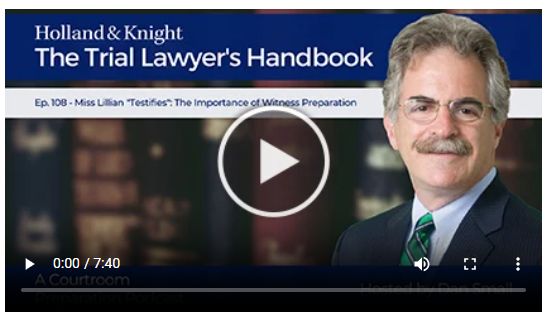In this episode of "The Trial Lawyer's Handbook" podcast, litigation attorney Dan Small describes the unnatural environment of the courtroom and the importance of preparing witnesses for the off-putting rhythm of testimony that he summarizes as "question, pause, answer, stop." In the corruption case United States v. Bert Lance, because the defense sought to call numerous character witnesses, the judge limited counsel to four legalistic questions. The most notable witness, Miss Lillian, the elderly mother of then-President Jimmy Carter, had known Lance his whole life and could have played a key role in his defense. However, she was not prepared for the unusual phrasing of the questions and, after an 18-hour flight to get to court, concluded her testimony in about two and a half minutes. Mr. Small reminds the listeners that every witness is Miss Lillian and must be prepared accordingly.
Podcast Transcript
Dan Small: There's nothing natural about a courtroom. The layout, the people, how we act, how we communicate: All of this and more is dramatically different from the real world. Even the rhythm of question and answer is unnatural. Question, pause, answer, stop. Rinse and repeat: Question, pause, answer, stop. How can lawyers expect normal people to deal with such an environment without a lot of help? We can't, we must not. Preparing witnesses is one of the most important parts of trial work, yet too often it's shortchanged or ignored entirely.
We've been talking in these episodes about my experience as a new prosecutor at the Department of Justice on the trial team prosecuting former United States budget director Bert Lance. In a well-tried case on both sides, Lance's team made a tactical error. They presented the court with a long list of character witnesses that they were going to call in Lance's defense. Too long. As I remember, there were 53 of them, but who knows. Rather than impressing the judge, it upset him.
Character testimony has faded somewhat from the trial scene, but it's basically people who know nothing about the facts of the case testifying that "Well, the defendant's a good guy, and he would not have done these terrible things." The judge in the Lance case, undoubtedly with visions of days or even weeks of these largely irrelevant testimonies dancing in his head, exercised his prerogative as a federal judge to drastically limit the questioning. Without diving into the murky law of character testimony, they were essentially limited to four legalistic — one might say mumbo-jumbo — questions about reputation.
The defense forged ahead. They didn't call all 53 character witnesses. They probably never were going to, but they did call a few. The most notable was Miss Lillian. Miss Lillian was the elderly and, I should say, saintly mother of the sitting president of the United States, Jimmy Carter. She was called in her home state of Georgia to testify for the local country banker, Bert Lance, who she had known, along with her son, all their lives.
Preparing Miss Lillian for her testimony should have been easy, right? "Miss Lillian, look here, the judge has limited us to these four legalistic questions. I don't know what they mean. You don't know what they mean. Read them carefully, but then don't worry about them — just tell us about Bert." As I said, she'd known Bert Lance since before he was born. Given a glass of iced tea on the front porch, she could have regaled you with heartwarming stories about Bert. And what would we on the prosecution team have done? Interrupted the saintly mother of the president in her hometown? What would that have looked like to Juror No. 6? No, we would have let her go on.
But this was not the front porch. There was no iced tea, and for whatever reason — time, opportunity, lack of understanding — she had not been prepared by the defense. She came into court after an 18-hour flight from a humanitarian mission in Africa, looking elderly and frail. She took the stand, she was asked these four strangely worded questions, was clearly confused, gave four one-syllable answers and she was done. They were out of questions. One of the news reporters in the room timed it. The saintly mother of the president of the United States, called in her own hometown, was on direct examination for only two and a half minutes.
Ironically, by contrast, it was the prosecution that had prepared her for questioning. One of the lead attorneys for the Department of Justice was a wonderful, experienced trial lawyer named Marvin Loewy. Knowing that Miss Lillian was coming to the courthouse, Marvin had placed himself outside in the corridor, and as she came in, he approached her with his most charming smile. "Miss Lillian," he said, "I just wanted to introduce myself. My name is Marvin, and I'm proud to say that I work for your son, the president, as a lawyer for the U.S. Department of Justice. Thank you so much for coming here after your long trip." Seeing a friend in a strange place, Miss Lillian smiled back, thanked him and walked into court a little happier.
So when the defense finished their absurdly short direct examination, no one expected any cross-examination, but Marvin knew better. He stood up, and with that same charming smile, he said, "Miss Lillian, my name's Marvin Loewy. I had the pleasure of meeting you a little earlier." And seeing a friend again in such a strange place, she smiled with relief and her own charm and said, "Oh yes, thank you, Mr. Loewy," to which Marvin replied, "I just wanted to thank you for taking the time out of your busy schedule to come to court." And she of course replied, "Well, it's been a real pleasure meeting you." And cross-examination was complete.
The notion that she was a defense witness, there to help Bert Lance, largely flew out the window with her lack of preparation by the defense and the charm preparation by the government.
It struck me then, and it strikes me now, that all of our witnesses are Miss Lillian. They all have a story to tell, but they've never told a story in the unnatural language of question and answer. Question, pause, answer, stop. What kind of a way is that to tell a story? We lawyers have to help them to understand just how different this is and prepare them to navigate those strange waters. The witness environment is an unnatural one for everybody, and it requires hard work and careful, extensive preparation.
If you're interested in additional strategies and advice about witness prep, check out my other podcast series called "Powerful Witness Preparation," where I discuss the examples set by Miss Lillian, and much, much more, based on my ABA manual, "Preparing Witnesses." Good luck in trial.
The content of this article is intended to provide a general guide to the subject matter. Specialist advice should be sought about your specific circumstances.


